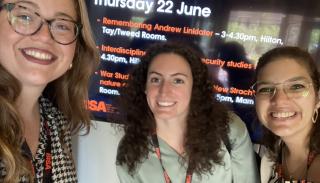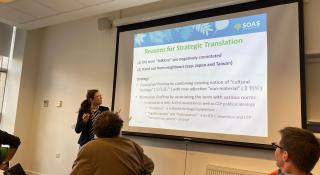
Breadcrumbs navigation
Presenting at #BISA2023: Interdisciplinary research in security studies
Tara Zammit, a PhD student from King’s College London and #BISA2023 delegate, sums up her research on the integration of women and LGBTQ+ personnel in the British Armed Forces. She also shares her experience of presenting at the BISA 2023 annual conference.
One of the most interesting parts of being an early career researcher in the field of security studies – and international studies more broadly – is the ability to encounter new and exciting research and ideas from all around the globe. I wanted to make the most of the opportunity to connect with new and old colleagues on the basis of this commitment to interdisciplinarity, and BISA 2023 presented a valuable chance to do so.
At this year’s annual conference in Glasgow, I was fortunate to be able to convene a panel on Interdisciplinary Research in Security Studies, sponsored by the European Journal of International Security. Chaired by Professor Jason Ralph, our panel of 90 minutes managed to explore topics such as ontological security and armed forces, European Union engagement in The Sahel, right-wing extremist manifesto analyses, and the changing character of warfare in the space domain.
During this panel, I was able to share the early stages of my doctoral research on the integration of women and LGBTQ+ personnel in the British Armed Forces. My project employs an ontological security lens to assess the success and/or failures around diversity and inclusion policies in the armed forces by looking at the experiences of personnel and how the institution self-securitises. Through incorporating insights and analysis from ontological security studies, feminist security studies, and military studies, my doctoral project seeks to develop strategies in which the goals of the defence institution can be aligned with those of personnel in a supportive, integrative, operationally effective way.
Having the opportunity to present my research to an audience comprised of international scholars, and alongside panel members with diverse interests in security studies, was invaluable. Professor Ralph and various audience members presented me with important questions about the research, my theoretical approach, and the intricacies of the project. It was a really useful experience which has helped me to develop my project and the paper which I presented, and to refine my initial thoughts and presentation style.
The conference itself was thought-provoking and informative, and the nature of international studies as a theme meant that where in one room, a panel could be discussing the development of artificial intelligence as a form of military technology, the room next door might feature panellists detailing the history of feminist foreign policy in Europe. This range of interests, insights, and experience made for a fascinating conference. It was a busy, fast-paced experience with lots of networking and coffee drinking throughout and around the sessions. I would highly recommend applying to present your own research and/or to attend in future.
"My project employs an ontological security lens to assess the success and/or failures around diversity and inclusion policies in the armed forces by looking at the experiences of personnel and how the institution self-securitises."
Author contacts
Twitter: https://twitter.com/tarazammit
LinkedIn: https://www.linkedin.com/in/zammit-tara/


